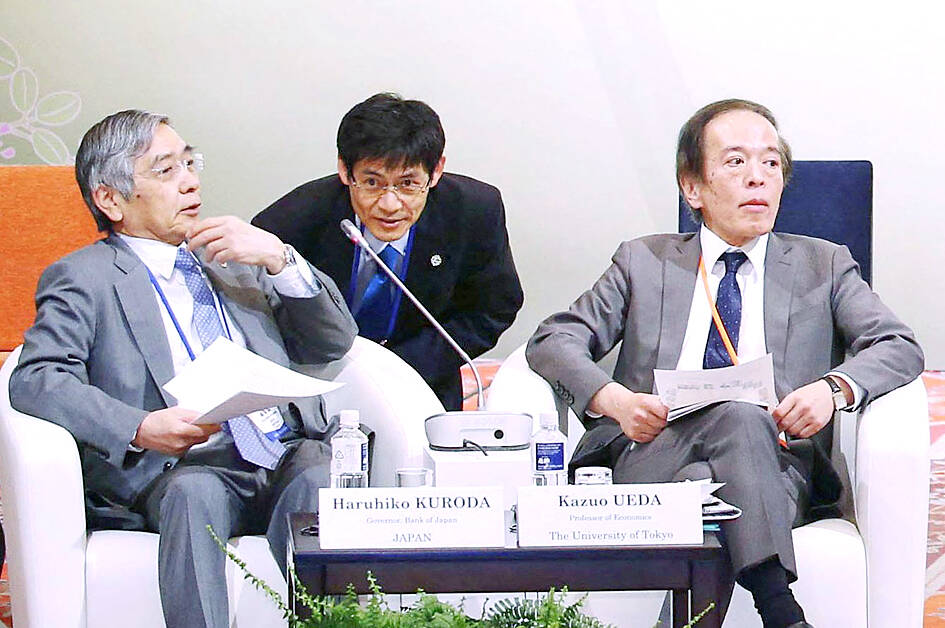The Japanese government is likely to appoint Kazuo Ueda, an academic and a former member of the Bank of Japan’s (BOJ) policy board, as the central bank’s next governor, the Nikkei newspaper reported yesterday.
Here are reactions to the report:
“The key thing for me is that [BOJ Deputy Governor Masayoshi] Amamiya appears to have turned down the offer to have been made governor of the Bank of Japan. He has been at the BOJ a long time and was considered a key supporter of [BOJ Governor Haruhiko] Kuroda and his policies, that is very loose monetary policy and a weak JPY [yen]. So with him gone, the reaction we are seeing is probably one of relief that the current weak-JPY policy may be coming to an end,” said Stuart Cole, head macro economist at Equiti Capital in the UK.

Photo: REUTERS
“However, the apparent choice for governor now — Ueda — is somewhat of a wild card for the markets. He has been a policymaker at the BOJ in past, from 1998 to 2005, but what his views are on the current monetary policy stance are mostly unknown. So we could yet be in for a volatile ride in the JPY if he turns out to be singing from the same hymn sheet as Kuroda,” he said.
Jane Foley, head of foreign exchange strategy at Rabobank in London, said there are “various papers published by him” on the BOJ Web site since 2005, “but they’re quite few and far between, and I think he was not top of the list.”
“What I would imagine, is that because he has been on board of the Bank of Japan, that he is relatively dovish, because just about everyone that’s been on the board of the Bank of Japan has been dovish for a long time. Right now, to be honest, we can only assume that. We need some commentary from him,” she said. “I have been of the view for a while that probably — whoever takes over as the governor — there may not be any huge initial change in so far as everyone is trying to nurture inflation into place, everyone is waiting for the spring wage talks and the initial indications are a little bit positive, but perhaps not enough for a huge turnaround.”
“Even if Kuroda remained in control, we could get an adjustment in yield-curve control this year anyway,” Foley added.
Hiroaki Muto, an economist at Sumitomo Life Insurance Co in Tokyo, said that “Ueda seems a very different type from Kuroda, in terms of being an academic who would plainly conduct policy based on actual economic fundamentals and value conversations with the market.”
“He may not be super hawkish type either, so the upcoming [normalization] would take place very slowly, no matter how the new leadership revises the joint statement” with the government, Muto said.

Zhang Yazhou was sitting in the passenger seat of her Tesla Model 3 when she said she heard her father’s panicked voice: The brakes do not work. Approaching a red light, her father swerved around two cars before plowing into a sport utility vehicle and a sedan, and crashing into a large concrete barrier. Stunned, Zhang gazed at the deflating airbag in front of her. She could never have imagined what was to come: Tesla Inc sued her for defamation for complaining publicly about the vehicles brakes — and won. A Chinese court ordered Zhang to pay more than US$23,000 in

Taiwan Semiconductor Manufacturing Co (TSMC, 台積電) yesterday held its first board of directors meeting in the US, at which it did not unveil any new US investments despite mounting tariff threats from US President Donald Trump. Trump has threatened to impose 100 percent tariffs on Taiwan-made chips, prompting market speculation that TSMC might consider boosting its chip capacity in the US or ramping up production of advanced chips such as those using a 2-nanometer technology process at its Arizona fabs ahead of schedule. Speculation also swirled that the chipmaker might consider building its own advanced packaging capacity in the US as part

‘NO DISRUPTION’: A US trade association said that it was ready to work with the US administration to streamline the program’s requirements and achieve shared goals The White House is seeking to renegotiate US CHIPS and Science Act awards and has signaled delays to some upcoming semiconductor disbursements, two sources familiar with the matter told reporters. The people, along with a third source, said that the new US administration is reviewing the projects awarded under the 2022 law, meant to boost US domestic semiconductor output with US$39 billion in subsidies. Washington plans to renegotiate some of the deals after assessing and changing current requirements, the sources said. The extent of the possible changes and how they would affect agreements already finalized was not immediately clear. It was not known

Taiwan Semiconductor Manufacturing Co (TSMC, 台積電) yesterday said that its investment plan in Arizona is going according to schedule, following a local media report claiming that the company is planning to break ground on its third wafer fab in the US in June. In a statement, TSMC said it does not comment on market speculation, but that its investments in Arizona are proceeding well. TSMC is investing more than US$65 billion in Arizona to build three advanced wafer fabs. The first one has started production using the 4-nanometer (nm) process, while the second one would start mass production using the